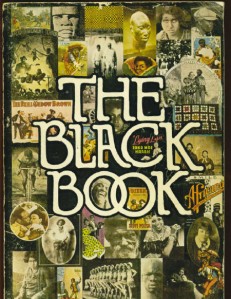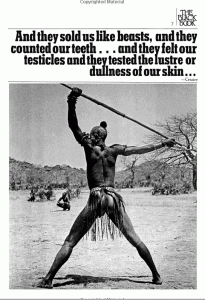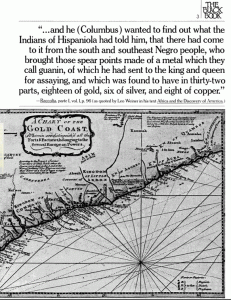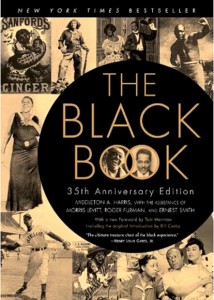Originally published in 1974 at the height of the Black Arts Movement, The Black Book is a dizzying anthology of hundreds of archival documents, photographs, eyewitness accounts and observations compiled by folk historians and scholars to preserve and publicize profound aspects of the African American experience. It’s a rich and complicated story told through words and documentation, a photo album, a scrapbook, a treasure chest and a time capsule. It has been called “one of the most straightforward meditations ever published on the history of race relations in the United States” and a breathtaking testament to the wisdom, strength, talents and perseverance of black men and women throughout history. Henry Louis Gates, Jr calls The Black Book “the ultimate treasure chest of the black experience”. Toni Morrison wrote in her 1974 essay Rediscovering Black History: “Clearly, it was not a book to be put together by writers. What was needed were collectors––people who had the original raw material documenting our life.â€
In 6th grade, we had read about the ships that brought Africans over to be sold as slaves in America and the traumatizing illustrations of the ship’s lower deck slave quarters burned fresh in my mind. My Social Studies teacher had a copy of The Black Book in his office. Here were photographs of actual slave owners and slaves, actual slavery ads for the public auction of slaves including one for a young mother and her three children who could be sold with only one or two the children “if it best suits the purchaser.” There were terrible stories abuse of slaves by their owners, thwarted attempts at escape by runaway slaves, of slave-catchers and black men who earned their freedom, and then turned around and purchased slaves themselves. There were photographs black men being flogged and in shackles, men burned to death and men hanging from nooses in trees. There were maps of the underground railroads of the gold coast, and antebellum rewards posters for the return of runaway slaves. Mercifully interspersed with all the traumatizing images were all kinds of images reflecting black history in America: black cowboys showgirls, dandies and hepcats, inventors and their patent applications, gorgeous church going folks in chimerical hats, jazzy jazz types and dancers, movie posters from Hollywood, and 20th century sheet music, and of highest priority to me, a list of black jockeys who’ve won the Kentucky Derby. Â
Random House released a spectacular 35th Anniversary Edition of The Black Book last year – a meticulously curated reissue with a new forward and original poem by Toni Morrison: The Black Book speaks: “Between my top and my bottom, my right and my left, I hold what I have seen, what I have done, and what I have thought. I am everything I have hated: labor without harvest; death without honor; life without land or law. I am a Black woman holding a white child in her arms singing to her own baby lying unattended in the grass…I am all the ways I have failed… I am all the ways I survived…I am all the things I have seen…And I am all the things I have ever loved…â€
Although I am partial to the wild and wonderful edition from off my Social Studies teacher’s coffee table, the reissue is beautifully and faithfully presented, and remains a timeless and vital record of the everyday suffering, wisdom and triumphs that tie us all to African American history and culture, The Black Book honors the past in all it’s forms; the horrific, the vulgar, the rich and triumphant. As Gloria Steinem said in her review of the book:
“There is not a member of the human family on earth who cannot learn from it.”





